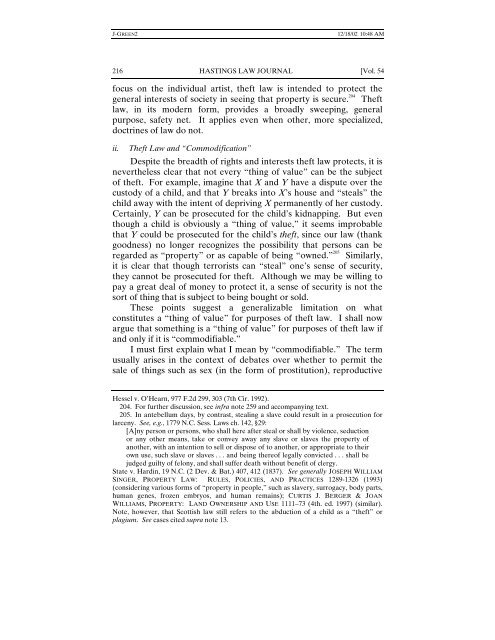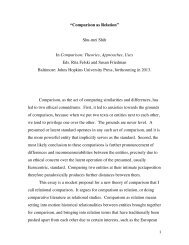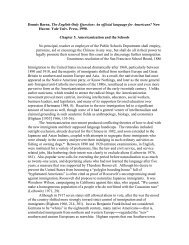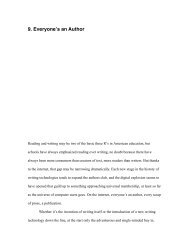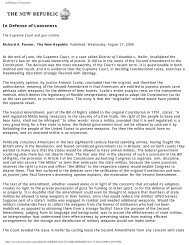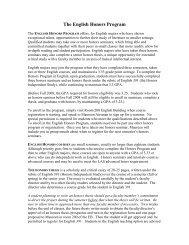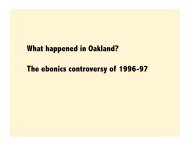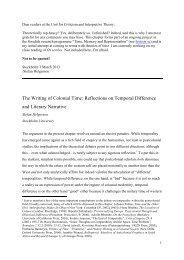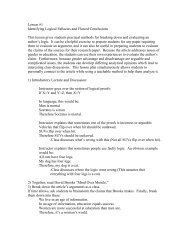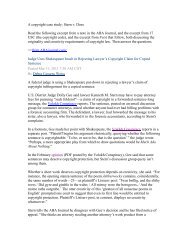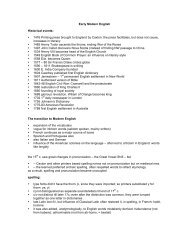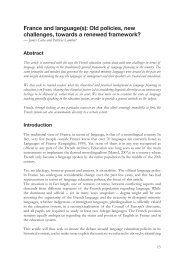Plagiarism, Norms, and the Limits of Theft Law: Some ... - English
Plagiarism, Norms, and the Limits of Theft Law: Some ... - English
Plagiarism, Norms, and the Limits of Theft Law: Some ... - English
Create successful ePaper yourself
Turn your PDF publications into a flip-book with our unique Google optimized e-Paper software.
J-GREEN2 12/18/02 10:48 AM<br />
216 HASTINGS LAW JOURNAL [Vol. 54<br />
focus on <strong>the</strong> individual artist, <strong>the</strong>ft law is intended to protect <strong>the</strong><br />
general interests <strong>of</strong> society in seeing that property is secure. 204 <strong>Theft</strong><br />
law, in its modern form, provides a broadly sweeping, general<br />
purpose, safety net. It applies even when o<strong>the</strong>r, more specialized,<br />
doctrines <strong>of</strong> law do not.<br />
ii. <strong>Theft</strong> <strong>Law</strong> <strong>and</strong> “Commodification”<br />
Despite <strong>the</strong> breadth <strong>of</strong> rights <strong>and</strong> interests <strong>the</strong>ft law protects, it is<br />
never<strong>the</strong>less clear that not every “thing <strong>of</strong> value” can be <strong>the</strong> subject<br />
<strong>of</strong> <strong>the</strong>ft. For example, imagine that X <strong>and</strong> Y have a dispute over <strong>the</strong><br />
custody <strong>of</strong> a child, <strong>and</strong> that Y breaks into X’s house <strong>and</strong> “steals” <strong>the</strong><br />
child away with <strong>the</strong> intent <strong>of</strong> depriving X permanently <strong>of</strong> her custody.<br />
Certainly, Y can be prosecuted for <strong>the</strong> child’s kidnapping. But even<br />
though a child is obviously a “thing <strong>of</strong> value,” it seems improbable<br />
that Y could be prosecuted for <strong>the</strong> child’s <strong>the</strong>ft, since our law (thank<br />
goodness) no longer recognizes <strong>the</strong> possibility that persons can be<br />
regarded as “property” or as capable <strong>of</strong> being “owned.” 205 Similarly,<br />
it is clear that though terrorists can “steal” one’s sense <strong>of</strong> security,<br />
<strong>the</strong>y cannot be prosecuted for <strong>the</strong>ft. Although we may be willing to<br />
pay a great deal <strong>of</strong> money to protect it, a sense <strong>of</strong> security is not <strong>the</strong><br />
sort <strong>of</strong> thing that is subject to being bought or sold.<br />
These points suggest a generalizable limitation on what<br />
constitutes a “thing <strong>of</strong> value” for purposes <strong>of</strong> <strong>the</strong>ft law. I shall now<br />
argue that something is a “thing <strong>of</strong> value” for purposes <strong>of</strong> <strong>the</strong>ft law if<br />
<strong>and</strong> only if it is “commodifiable.”<br />
I must first explain what I mean by “commodifiable.” The term<br />
usually arises in <strong>the</strong> context <strong>of</strong> debates over whe<strong>the</strong>r to permit <strong>the</strong><br />
sale <strong>of</strong> things such as sex (in <strong>the</strong> form <strong>of</strong> prostitution), reproductive<br />
Hessel v. O’Hearn, 977 F.2d 299, 303 (7th Cir. 1992).<br />
204. For fur<strong>the</strong>r discussion, see infra note 259 <strong>and</strong> accompanying text.<br />
205. In antebellum days, by contrast, stealing a slave could result in a prosecution for<br />
larceny. See, e.g., 1779 N.C. Sess. <strong>Law</strong>s ch. 142, §29:<br />
[A]ny person or persons, who shall here after steal or shall by violence, seduction<br />
or any o<strong>the</strong>r means, take or convey away any slave or slaves <strong>the</strong> property <strong>of</strong><br />
ano<strong>the</strong>r, with an intention to sell or dispose <strong>of</strong> to ano<strong>the</strong>r, or appropriate to <strong>the</strong>ir<br />
own use, such slave or slaves . . . <strong>and</strong> being <strong>the</strong>re<strong>of</strong> legally convicted . . . shall be<br />
judged guilty <strong>of</strong> felony, <strong>and</strong> shall suffer death without benefit <strong>of</strong> clergy.<br />
State v. Hardin, 19 N.C. (2 Dev. & Bat.) 407, 412 (1837). See generally JOSEPH WILLIAM<br />
SINGER, PROPERTY LAW: RULES, POLICIES, AND PRACTICES 1289-1326 (1993)<br />
(considering various forms <strong>of</strong> “property in people,” such as slavery, surrogacy, body parts,<br />
human genes, frozen embryos, <strong>and</strong> human remains); CURTIS J. BERGER & JOAN<br />
WILLIAMS, PROPERTY: LAND OWNERSHIP AND USE 1111–73 (4th. ed. 1997) (similar).<br />
Note, however, that Scottish law still refers to <strong>the</strong> abduction <strong>of</strong> a child as a “<strong>the</strong>ft” or<br />
plagium. See cases cited supra note 13.


